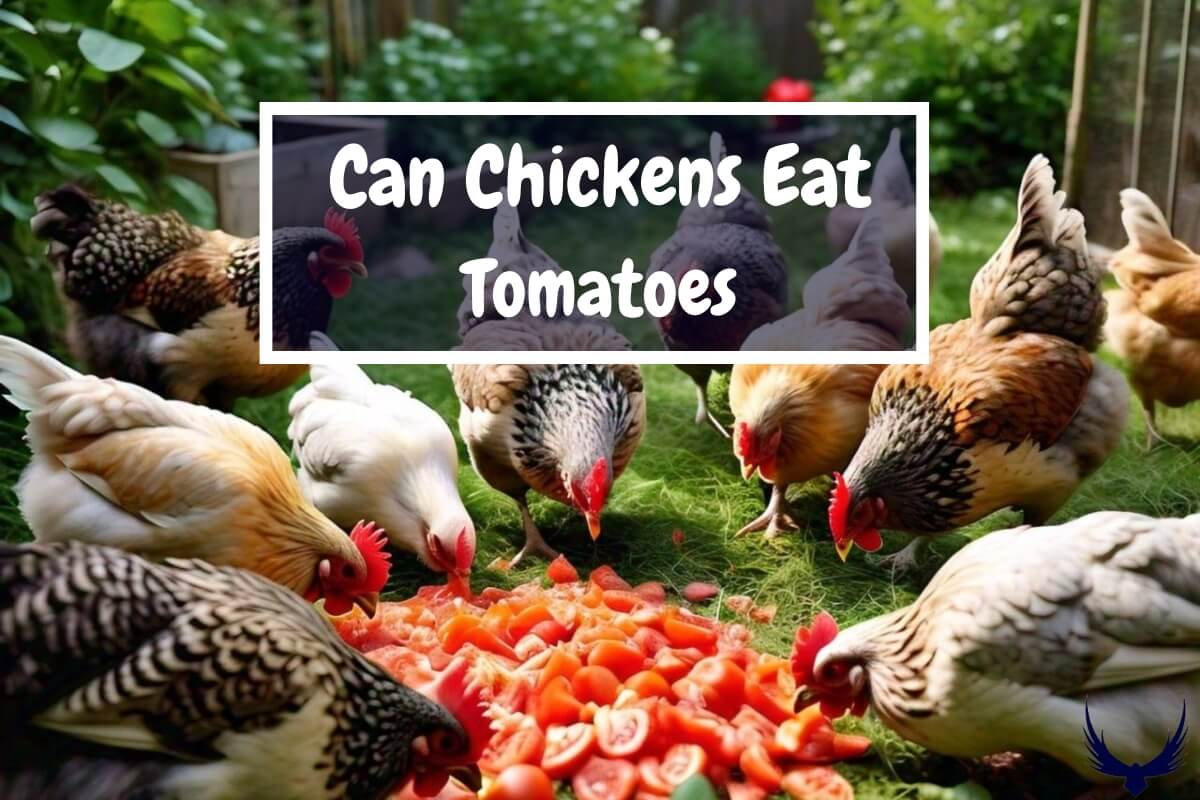Chickens are said to eat a variety of foods, but there’s a debate about whether they can eat tomatoes. As more people raise chickens in their backyard, they want to know if it’s safe to give tomatoes to their feathered friends.
Before you give your chickens tomatoes, let’s find out Can Chickens Eat Tomatoes?
Can Chickens Eat Tomatoes Safely?
Chickens can safely eat tomatoes. Ripe tomatoes are a healthy treat for chickens, providing minerals, vitamins as well as antioxidants. Green tomatoes and tomato plants have a toxic compound that can harm chickens.
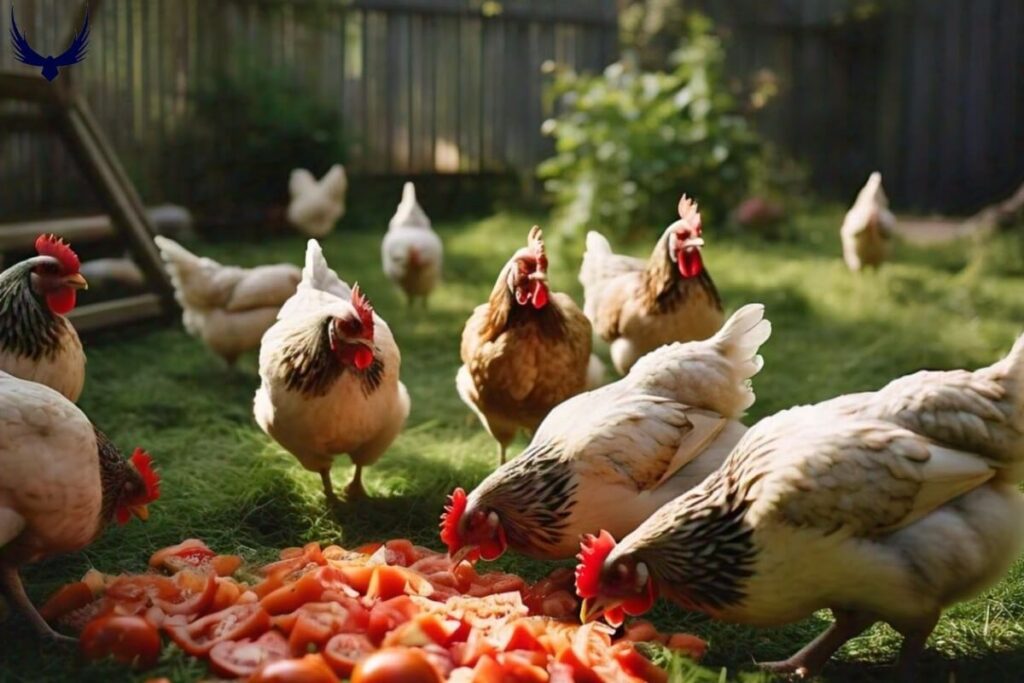
Tomatoes should be given in moderation and not replace the chickens’ regular balanced diet. Too many tomatoes can cause digestive issues due to their acidity. It’s also important to ensure that any tomatoes fed to chickens are free from pesticides or other harmful chemicals.
Overall, when offered occasionally and properly prepared, tomatoes can be a tasty and nutritious snack for your chickens.
Nutritional Benefits of Tomatoes for Chickens
Following are the nutritional benefits of tomatoes for chickens:
Vitamins
- Vitamin A: It is essential for vision, immune function, and egg production.
- Vitamin C: It boosts the immune system and helps with stress management.
- Vitamin K: It is important for blood clotting and bone health.
- Vitamin B6 (Pyridoxine): It aids in protein metabolism and red blood cell formation.
- Vitamin E: It acts as an antioxidant and supports immune function.
Minerals
- Potassium: It regulates fluid balance and muscle function.
- Manganese: It is important for bone formation and enzyme activation.
- Copper: It aids in iron absorption and red blood cell formation.
- Iron: It is essential for oxygen transport in the blood.
- Phosphorus: It is crucial for bone health and eggshelll formation.
Antioxidants
- Lycopene: A powerful antioxidant that may help reduce the risk of certain diseases.
- β-carotene: It is precursor to Vitamin A, supports immune function and eye health.
- Chlorogenic acid: It helps to reduce inflammation.
- Naringenin: A flavonoid with anti-inflammatory properties.
Health Benefits for Chickens
- Improved Egg Quality: The vitamins and minerals in tomatoes can contribute to eggshell strength and yolk color.
- Enhanced Immune System: The combination of vitamins C and E along with antioxidants helps to boost the chicken’s immune response.
- Better Feather Condition: Vitamins A and E contribute to healthier feathers.
- Improved Digestion: The fiber content aids in maintaining a healthy digestive system.
- Hydration: The high-water content in tomatoes can help keep chickens hydrated in hot weather.
- Eye Health: Vitamin A and β-carotene support good vision.
- Bone Health: Vitamins K and D along with minerals like phosphorus contribute to stronger bones.
- Stress Reduction: Vitamin C can help chickens cope with environmental stresses.
- Antioxidant Protection: The various antioxidants in tomatoes help protect cells from damage caused by free radicals.
What Parts of Tomatoes Can Chickens Eat?
Following are the parts of tomatoes which chickens can eat:
Ripe Tomatoes: Ripe tomatoes are safe for chickens and full of nutrients. Cut them into small pieces before feeding them to chickens.
Tomato Flesh: Tomato flesh is safe to eat and has lots of water, vitamins, and minerals. It can be offered raw or cooked.
Tomato Skin: The skin is edible, but some chickens may have trouble digesting it, so consider removing thick skin from larger tomatoes.
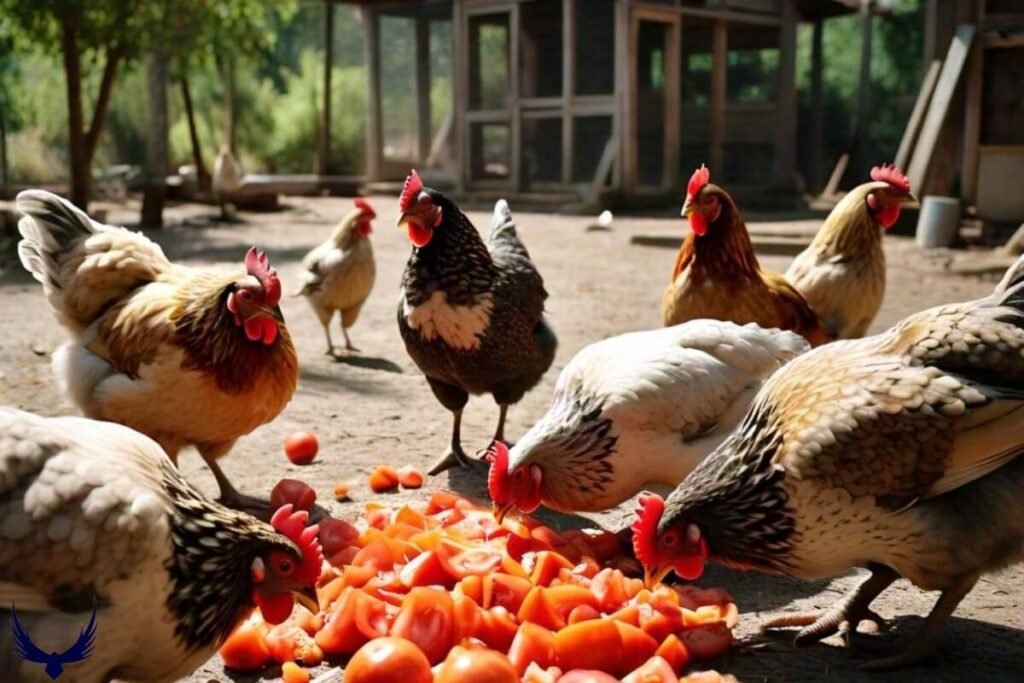
Tomato Seeds: Tomato seeds are safe and contain nutrients and oils, but some chickens may not fully digest them.
Tomato Juice: Pure tomato juice is a good source of hydration and nutrients but avoid juice with added salt or preservatives.
Parts to Avoid
Green, Unripe Tomatoes: Green tomatoes are not safe to eat because they have a lot of solanine which is toxic.
Tomato Leaves: The leaves of a tomato plant are also unsafe for chickens to eat because they contain solanine and other harmful substances.
Tomato Stems: The tomato plant stem is not safe for chickens to eat either because they also have solanine.
Tomato Plant: The whole tomato plant except for the ripe fruit contains solanine and can be toxic if eaten by chicken.
How to Feed Tomatoes to Chickens?
Following are the ways to feed tomatoes to chickens including preparation and serving methods:
Preparation
Selection: Choose ripe and firm tomatoes. Avoid overripe, moldy, or damaged ones. If possible, pick organic to reduce pesticide exposure
Washing: Wash tomatoes thoroughly and rub gently to remove dirt
Removing Unwanted Parts: Cut off the stem and any green parts. Remove blemishes or soft spots.
Cutting: Slice tomatoes into small pieces about 1 to 2 inch cubes. For cherry tomatoes, cut them in half or quarters. Make sure the pieces are small to prevent choking.
Serving Methods
Raw Chunks: Scatter the cut tomato pieces in the chicken run for hydration on warm days.
Mashed: Lightly mash the tomatoes for smaller or younger chickens.
Mixed with Other Foods: Combine tomato pieces with other chicken-safe fruits (Kiwi, Apples, Strawberries, Bananas, Oranges, and Pineapple) or vegetables such as Celery or mix into their regular feed for added nutrition and variety.
Frozen Treats: Freeze tomato pieces in ice cube trays for hot days.
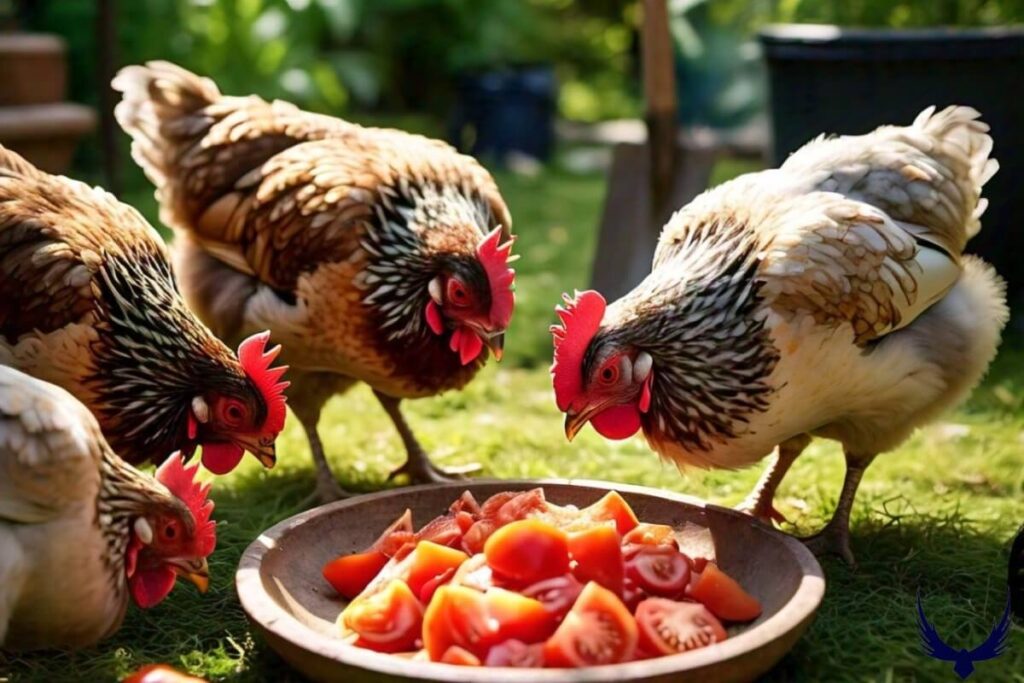
Cooked: Lightly cook tomatoes to soften them and cool them before serving to chickens. Can be mixed with other cooked vegetables like Jalapenos and Broccoli.
Pureed: Blend tomatoes into a smooth puree. It can be mixed with feed or offered separately.
How Often Can Chickens Have Tomatoes?
Frequency: Tomatoes should be considered a treat, not a regular food. Give them 2 to 3 times a week. Offer more in summer for hydration, less in winter. Mix with other treats such as Mushrooms for variety.
Quantity: Treats including tomatoes should not exceed 10% of a chicken’s daily diet. Start with about 1 to 2 cherry tomatoes or 1/4 of a regular tomato per chicken. Amount can be adjusted based on the chicken’s size and health. For a small flock (4 to 6 chickens) offer 1 to 2 medium tomatoes total. Increase the amount for larger flocks. Adult chickens can have more treats than young birds.
Risks of Feeding Tomatoes to Chickens
Following are the risks associated with feeding tomatoes to chickens:
Solanine Toxicity: Green parts of tomatoes have a toxic compound called solanine. Symptoms include tiredness, weakness, stomach problems, and in severe cases, nerve issues. To prevent this, only give ripe, red tomatoes and avoid green parts, leaves, and stems.
Calcium Absorption: Oxalic acid in tomatoes can interfere with calcium absorption if fed excessively. Symptoms include weakened eggshells and reduced bone strength. Balance tomato treats with calcium-rich foods to prevent calcium absorption issues.
Digestive Upset: Feeding too much tomatoes suddenly can cause digestive problems like diarrhea, reduced appetite, and tiredness. To avoid this, introduce tomatoes slowly and feed them in moderation.
Nutritional Imbalance: Eating too many tomatoes can replace other important nutrients leading to issues like lower egg production, weight loss, and nutrient deficiencies.
Allergic Reactions: Some chickens may be sensitive to tomatoes. Symptoms can include skin irritation, digestive upset, and respiratory issues. Introduce tomatoes slowly and monitor each chicken for any reactions.
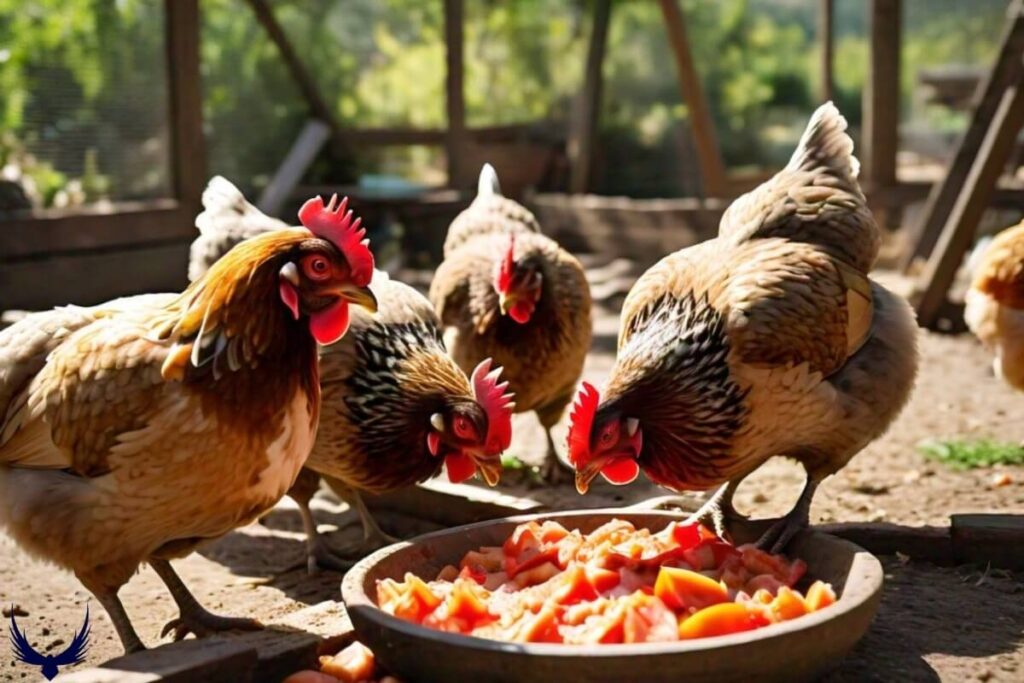
Reduced Egg Quality: Too many tomatoes can affect egg flavor and shell quality. Symptoms include changes in egg taste or appearance. Moderation in tomato intake and a balanced diet can prevent this issue.
Choking Hazard: Large tomato pieces can cause choking, leading to gasping, neck stretching, and distress. To prevent this, cut tomatoes into small pieces that are easy to eat.
Acidic Content: Tomatoes’ acidity can upset chickens’ digestion if fed too much. Symptoms include crop irritation and reduced feed intake. Feed tomatoes in moderation and balance with less acidic foods.
Seed Impaction: Excessive seed consumption can cause crop impaction. Symptoms include swollen crops, reduced appetite, and lethargy. Consider removing seeds from larger tomatoes to prevent impaction.
What Things to Consider Before Feeding Tomatoes to Chickens?
Mold and Rot: Check each tomato for mold or rot. Look for discolored spots, fuzzy growths, or soft areas. Fresh tomatoes should smell slightly sweet, not sour. If unsure, cut the tomato open to check for mold. Do not feed partially moldy tomatoes to chickens. Check garden tomatoes for signs of blight or fungal diseases that can harm chickens.
Pesticide Exposure: Prefer organic tomatoes to reduce pesticide exposure. Wash all tomatoes well with water and rub gently. For store-bought non-organic tomatoes, think about peeling the skin before serving to chickens to remove pesticide residues. Be cautious with store-bought tomatoes in off-season, as they may have more pesticides.
Timing: Feed tomatoes in the morning or early afternoon. Avoid late evening feeding to ensure proper digestion before roosting
Flock Size: Ensure there are enough pieces for all chickens to avoid competition. Consider separate feeding areas for smaller or timid chickens
Can Baby Chickens Eat Tomatoes?
Baby chickens, or chicks, can eat tomatoes, but it’s important to introduce them carefully and at the right age. It’s best to wait until chicks are at month old before offering tomatoes as a treat.
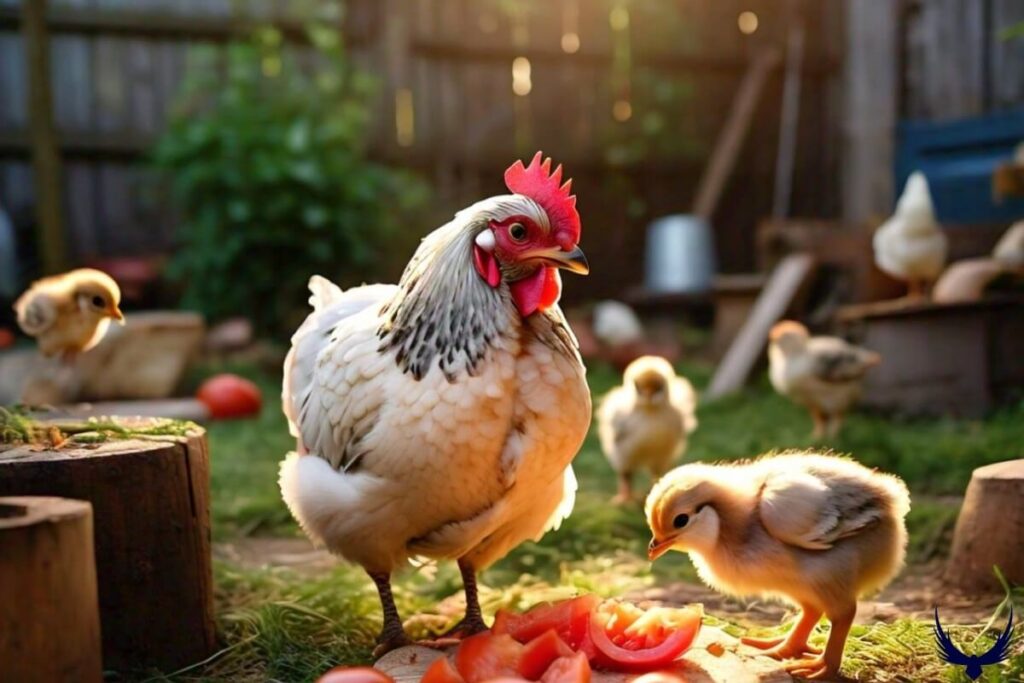
When introducing tomatoes to chicks, start with very small amounts – a tiny piece about the size of a pea per chick is sufficient and make sure it’s ripe and cut into small, soft pieces to avoid choking.
Only give them ripe tomatoes, not green ones. Start giving chicks tomatoes once a week, then increase to twice or thrice a week as the chicks get older.
Can Chickens Eat Raw Tomatoes?
Chickens like to eat raw tomatoes. It’s best to feed them ripe, red tomatoes because they have more vitamins and antioxidants. Green tomatoes contain higher levels of solanine which can be toxic, so avoid giving them to chickens.
Can Chickens Eat Cooked Tomatoes?
Chickens can safely eat cooked tomatoes which can be a nutritious treat for them. Cooking tomatoes increases the availability of certain nutrients such as lycopene.
It’s important to ensure that the cooked tomatoes are plain, without added salt, oils, or seasonings that could be harmful to chickens.
Are Tomatoes Good for Chickens to Eat?
Tomatoes can be a beneficial treat for chickens when fed in moderation. They are rich in minerals, vitamins as well as antioxidants which can support immune health and overall well-being.
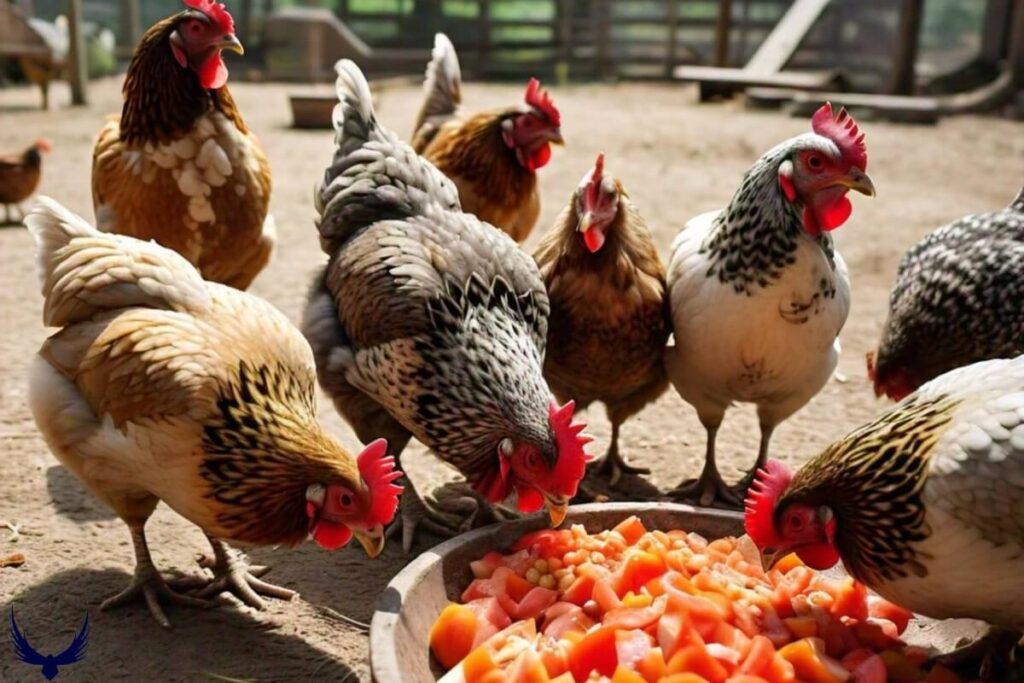
Tomatoes also provide hydration due to their high-water content. But treats like tomatoes should be given in small amounts to avoid nutritional problems and make sure chickens get all the nutrients they need from their regular food.
What Age Can Chickens Eat Tomatoes?
Chickens can eat tomatoes when they are fully grown and eating adult chicken feed, around 3 to 4 months old. Before that, young chickens should eat starter and grower feeds for proper growth. Giving tomatoes too early can upset their nutritional balance and cause digestive issues.
When chickens are grown, tomatoes can be offered as an occasional treat, but they should eat balanced feed suitable for their age and egg production.
Can Chickens Eat Tomatoes Everyday?
Chickens can eat tomatoes, but it’s not recommended to feed them tomatoes every day. Tomatoes should be considered a treat, not a regular part of their diet. It’s best to offer tomatoes once or twice a week at most.
Feeding tomatoes too frequently can lead to nutritional imbalances due to their acidity.
Do Chickens Like Tomatoes?
Chickens enjoy eating tomatoes, finding them to be a tasty and nutritious treat. Ripe tomatoes are safe for chickens to consume in moderation, providing vitamins and hydration.
Green tomatoes and tomato plants contain solanine which can be harmful to chickens if ingested in large quantities. It’s best to give tomatoes to chickens in small amounts as a treat.
Can Chickens Eat Tomato Plants?
Chickens shouldn’t eat tomato plants because they can be harmful. Ripe tomatoes are okay for chickens, but the leaves, stems, and green tomatoes have solanine. This can make chickens sick if they eat a lot of it.
It’s important to keep chickens away from tomato plants and only offer them ripe tomato fruits as occasional treats.
Can Chickens Eat Tomato Seeds?
Chickens can safely eat tomato seeds. The seeds are not toxic and contain some nutritional value including oils and fiber. Most chickens can eat the seeds along with the flesh of the tomato without any issues. But some chickens are unable to fully digest larger seeds which can be seen in their droppings.
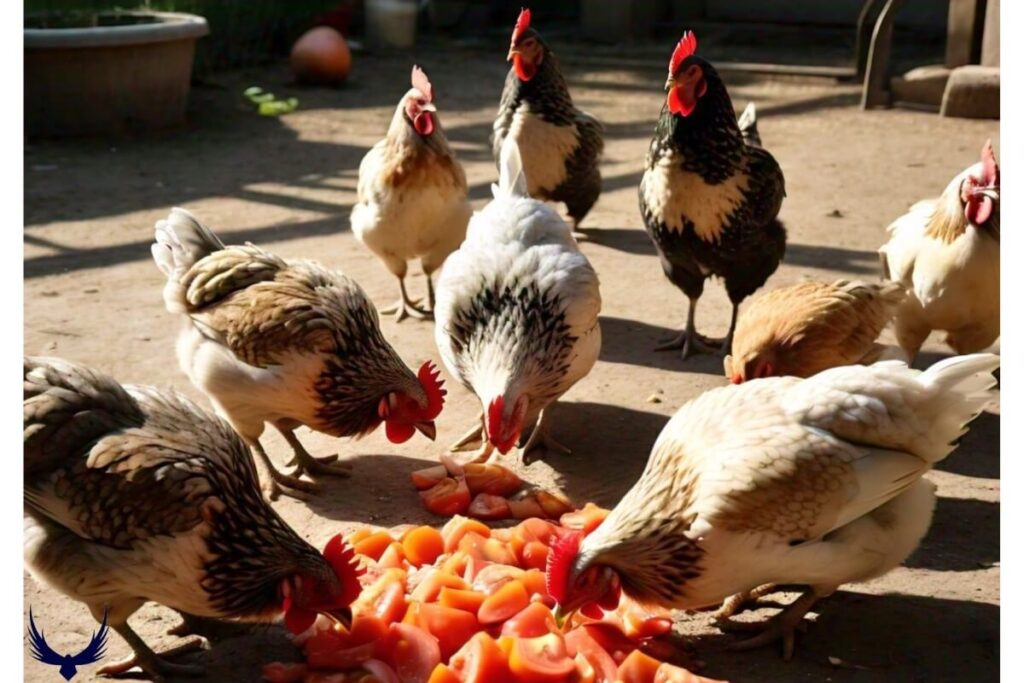
If you’re concerned about this, you can remove the seeds before feeding tomatoes to your chickens for smaller breeds or younger ones.
Can Chickens Eat Tomato Leaves?
Chickens should not eat tomato leaves. Tomato leaves contain solanine. Consumption of tomato leaves can lead to digestive problems and neurological symptoms. It’s best to keep tomato leaves away from chickens to keep them safe and healthy.
Make sure to give chickens safe food and avoid letting them eat harmful plants.
Can Chickens Eat Tomato Skins?
Chickens can eat tomato skins from ripe tomatoes. The skin contains nutrients and fiber, making it a healthy part of the tomato for chickens to consume. Some chickens might have trouble digesting the tough skins of big tomatoes.
Cut the tomatoes into small pieces or mash them lightly to help them eat and digest better. Make sure the skins are from fully ripe red tomatoes and not green ones which can be bad for chickens.
Can Chickens Eat Tomato Stems?
Chickens should not eat tomato stems. Like the leaves and other green parts of the tomato plant, stems contain solanine. Consumption of tomato stems can lead to digestive upset, weakness, and more severe health issues in chickens.
It’s important to remove stems and only offer the ripe, red part when feeding tomatoes to chickens.
FAQs – Can Chickens Eat Tomatoes?
Can Chickens Eat Tomato Scraps?
Chickens can eat fresh tomato scraps like the flesh and seeds. These scraps give them vitamins and water, which is good for them. But don’t give them tomato leaves or stems because they have solanine which can be harmful. Give tomato scraps in small amounts as part of their diet.
Can Chickens Eat Moldy Tomatoes?
Chickens should not be fed moldy tomatoes. Mold can produce harmful toxins that may cause illness or even death in chickens. These toxins can lead to respiratory issues, digestive problems, and other health complications. Moldy food can also spread spores and contaminate other feed, which can be harmful to the entire flock.
Do Chickens Eat Tomatoes Worms?
Chickens like to eat tomato hornworms. These large, green caterpillars are not only safe for chickens to consume but also provide a good source of protein. Letting chickens find these pests in your garden can help control the number of tomato hornworms and give your chickens a yummy snack.
Can Chickens Eat Tomato Sauce?
Tomato sauce is not recommended for their chickens. Most commercial tomato sauces contain added salt, sugar, and other seasonings that can be harmful to chickens. These additives may lead to digestive issues or electrolyte imbalances.
Can Chickens Eat Tomato Soup?
Tomato soup is not recommended for chicken. Most tomato soups contain high levels of sodium, additives, and sometimes dairy products that can be harmful to chickens’ digestive systems. These ingredients may cause digestive upset, dehydration, or nutritional imbalances.

